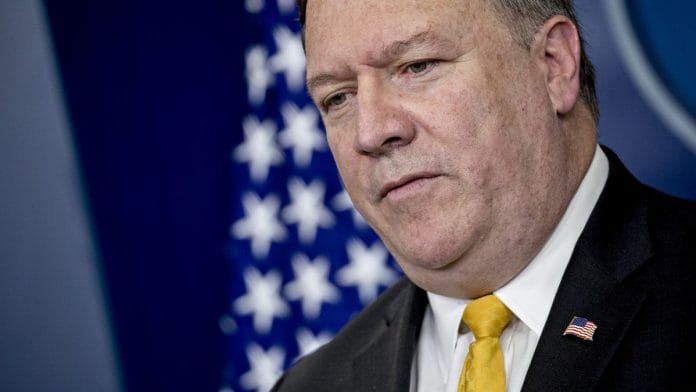New Delhi: The US and India have been discussing the Galwan Valley clash and New Delhi’s ongoing border tensions with Beijing, Secretary of State Mike Pompeo said Wednesday.
Addressing a media briefing Wednesday, Pompeo said he spoke frequently with his Indian counterpart S. Jaishankar. He also lauded New Delhi’s move to ban 59 Chinese apps.
“India has been a great partner. They are an important partner of ours. I have a great relationship with my foreign minister counterpart. We talk frequently about a broad range of issues. We talked about the conflict they had along their border with China,” Pompeo said in Washington.
He added, “We’ve talked about the risk that emanates from China, Chinese telecommunications infrastructure there, you’ve seen the decision they made to ban some several dozen Chinese software firms from operating inside of the country on phones of people operating inside of India.”
He said the “whole world is coalescing around the challenge that we face”. “Democracies, free nations of the world, will push back on these challenges together. I’m very confident of that,” he added.
Also Read: Why Xi’s show of force against India is a strategic gift for Trump
‘Huawei an arm of Chinese Communist Party’
According to Pompeo, the main reason why America’s relationship with China has changed is because of the Chinese Communist Party’s “behaviour”.
“These are not tit-for-tat exchanges. This is America standing up for its own people and the world now coming to understand the threat that the Chinese Communist Party is. So, to the extent there’s been a change in the relationship is a direct result of the behaviour of the Chinese Communist Party,” he said.
Pompeo also announced visa restrictions on Chinese tech companies such as Huawei for providing “material support to regimes engaging in human rights violations and abuses globally”.
He described Huawei, which was seen as a frontrunner in the advent of 5G technology around the world, as “an arm of the Chinese Communist Party’s surveillance state that censors political dissidents and enables mass internment camps in Xinjiang and the indentured servitude of its population shipped all over China”.
Also Read: Not just India, Tibet — China has 17 territorial disputes with its neighbours, on land & sea







U.S. must understand that problem lays with India’s gross overconfidence over its military capabilities and on the basis of these visions of self-grandeur India makes strategic miscalculations. Like in February last year, India went on like a rogue state conducting airstrikes inside Pakistan’s territory, hoping that with one airstrike India will not only establish new precedence in South-Asia but also indulge in the appeasement of the Hindu nationalist vote bank.